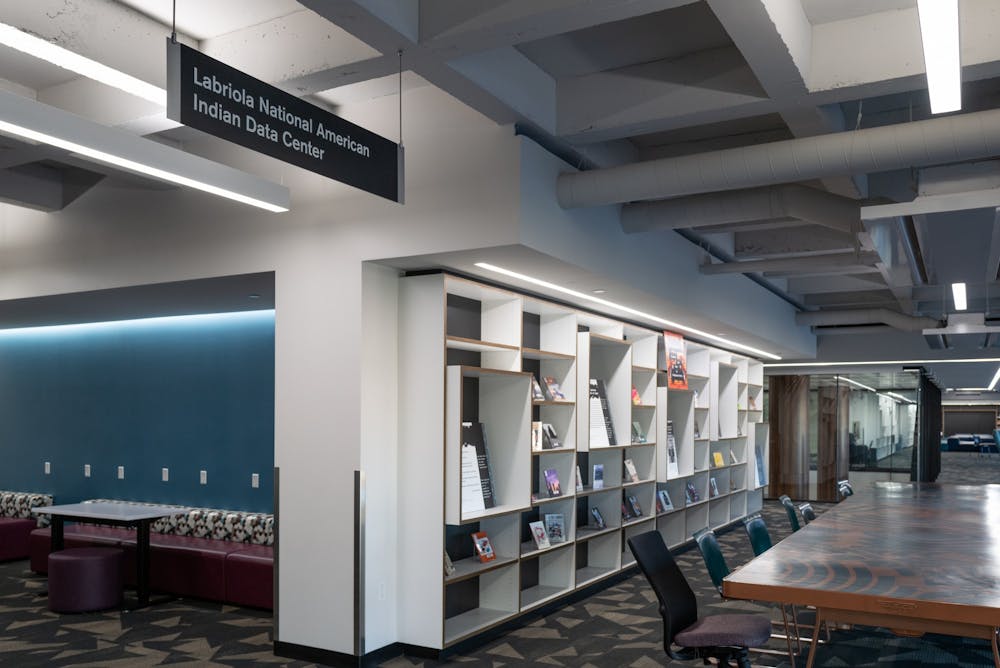The Labriola National American Indian Data Center is a growing safe space for Indigenous students and an archive defending Indigenous data sovereignty at ASU.
The Labriola Center has two physical locations, on the second floor of the Hayden Library on the Tempe campus, and on the third floor of the Fletcher Library on the West campus. These areas function as study spaces, community spaces and access points for some of the material held by the archive.
In the coming semester, the center is going to further cement Indigenous data sovereignty at ASU.
“The (goal) is to start working towards having our own policies and procedures," said Eric Hardy, a graduate student studying American Indian Studies and the senior program coordinator for the Labriola Center.
Next semester, the center also has plans to greatly expand its space on the Tempe campus.
“We're going to be consolidating our center into the second-floor space and then building out that center to be more engaging with performances, but also having more clear spaces for research and also hosting elders and different things,” Hardy said.
The center has many established relationships with the Indigenous communities in and around Phoenix, working with organizations including the Arizona Office of Indian Education and Cahokia in downtown Phoenix as well as Indigenous musicians and artists.
“Our Indigenous library within ASU is kind of like an Indigenous safe space, and (we) get people into our space through the programming,” Hardy said. “Our events sort of speak for themselves. I think a lot of that sort of speaks to this idea that we're doing something different and unique."
“We’ve held events such as an art exhibit that focused on a collection by Jean Chaudhuri, some Indigenous film screenings, and a Ribbon Skirt workshop," Yitazba Largo-Anderson, program coordinator for the center on the West campus, said in an email. "We’re reestablishing ourselves and seeing what kind of events work for the community at West campus and Gilbert area."
The programming at the center is not just entertainment, it's also a space for representation, engagement and frank conversations about the issues Indigenous people face.
“We talk about it openly… when I do presentations for students I talk about colonization, about settler colonialism, about historical trauma. Sometimes it feels like in a university environment that we shouldn't, especially to young kids. But we can and we should, especially when students say they have experienced this,” Hardy said.
The Labriola Center also addresses the issues Indigenous people face through archiving, providing access to a range of resources from poetry books to rare documents.
READ MORE: Book collection in ASU libraries showcases Indigenous stories
Its archiving process also corrects for some of the ways traditional archiving negatively impacts Indigenous people.
“A lot of archiving that happens now, is in a Western conversation about archiving, which is basically taking the history of someone's life and storing it. It's kind of seen as a prestigious thing. And that's fine, but sometimes when we do that, in terms of our Indigenous peoples, that feels like extraction,” Hardy said.
To prevent the extraction model of archiving, the Labriola Center practices community-driven archiving. Lourdes Pereira is a student archivist at the center with direct experience in community-driven archiving. She is a senior studying both American Indian Studies and Justice Studies and got her start at the center while researching her own community as a member of Hia-Ced O’odham.
“My tribe is not federally recognized, we are on the way to becoming federally recognized. And I was looking for some work about our community, and I actually saw that it was at the Labriola Center at West campus," Pereira said.
From there, she started working at the center and directly with Indigenous communities to put community-driven archiving into action.
“It's like (saying) ‘Community, you know how to take care of your knowledge system.’ So what we're going to do is provide an archival box, and some acid-free liners and folders. And they can do scanning and they do even an oral-based archive where they record it, and it's all for the community," Pereira said. "It's saying that you do not need outside entities like museums."
This practice has even earned the Labriola Center a prestigious grant from the Mellon Foundation to build archives within Indigenous communities,such as Pereira's.
The driving force behind community-driven archiving and the entire Labriola Center itself is sovereignty, according to Largo-Anderson.
"When we say 'Information is sacred,' it’s based on the fact that Indigenous peoples are the most researched people in the world and we have been documented. There is a lot of data on us from the time Columbus arrived, including data that is not necessarily supposed to be shared, like ceremonies, medicine bundles, etc.” Largo-Anderson said.
Historically and even still today, Indigenous people have not had control over their own information and records. But programs like the Labriola Center are Indigenous-led, and work with communities on their own terms, protecting their sovereignty.
While there are big plans in the works for next semester, the center is not slowing down its event schedule as they approach the end of the year. The Labriola Center website features several upcoming events, including a lo-fi study session and an art walk with an Indigenous artist in Phoenix. The center also maintains a blog run by student workers to highlight the work they do.
Edited by Sadie Buggle, Jasmine Kabiri and Anusha Natarajan.
Reach the reporter at syramir2@asu.edu and follow @nerdyoso on Twitter.
Like The State Press on Facebook and follow @statepress on Twitter.
Sophia is a senior studying biological sciences. This is her fifth semester with The State Press. She has also worked as a science and technology reporter.




